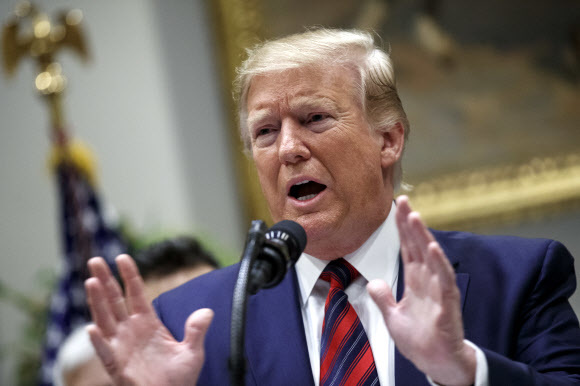Posted on : May.13,2019 18:24 KST
 |
|
US President Donald Trump talks to reporters at the White House on May 9. (EPA/Yonhap News)
|
On May 10, US President Donald Trump said he doesn’t consider missiles recently launched by North Korea to be a “breach of trust.” The message here is that Trump means to stick with his approach of resolving the North Korean nuclear issue through dialogue and negotiations despite the North’s military provocations. That position is likely to stabilize the situation on the Korean Peninsula and help bring a peaceful solution to the North Korean nuclear issue. We urge North Korea to respond favorably by refraining from action that crosses the line and by returning to the negotiating table.
Trump’s remarks on Friday tone down remarks he made the previous day: “We’re looking at it very seriously right now. [. . .] I don’t think they’re ready to negotiate.” Trump appears to have filtered out the somewhat heated and emotional language he used immediately after North Korea’s missile launch, following a process of internal discussion and policy review. Trump seems to have concluded that there’s no point in provoking North Korea when it’s not trying to torpedo the negotiations.
Trump highlighted the fact that North Korea’s missiles were “short-range” as the reason they didn’t constitute a breach of trust. This was a reference to the fact that, while North Korea did announce it was halting nuclear tests and the test launches of intercontinental ballistic missiles (ICBMs) in a statement released by the plenary session of the Central Committee of the Workers’ Party of Korea (WPK) in April 2018, it has never promised to stop launching short-range missiles. It was in this context that Trump said that “at some point” he might “consider that a breach of trust,” but “at this point, no.” Turned on its head, however, these comments can be seen as conveying a warning that Trump could regard the North as having crossed a red line if it carries out another provocation, such as launching a long-range missile.
The situation on the Korean Peninsula has been very delicate since North Korea’s missile launch. Stephen Biegun, the US State Department’s special representative for North Korea, exhibited caution during a recent trip to South Korea, refraining from any public remarks following a meeting on May 10 with his South Korean counterpart on the North Korean nuclear program and only making the generic statement that “the door is still open for North Korea to return to the negotiations.” At such a sensitive time, we need to be actively seeking a way to keep the situation stable.
Nor should the recently discussed idea of providing North Korea with food aid be shot down because of the missile launch. Food aid can still act as leverage for returning to the phase of dialogue and negotiations. We also need to listen to officials from the World Food Programme, who appealed on May 10 for humanitarian efforts to be kept separate from politics so that lives can be saved in North Korea. Turning a deaf ear to the worst food crisis in North Korea in 10 years – 40% of the population, or 10,100,000 people, are going hungry – because of political and military issues isn’t something we should be doing as fellow Koreans, anyway.
We hope that the meeting at the Blue House with the leaders of the ruling and opposition parties that was proposed by President Moon Jae-in during his interview on the second anniversary of his inauguration on May 9 will go ahead, allowing adequate discussion of the timing, amount, and method of food aid to North Korea. We also hope that North Korea will contemplate the lesson that it has nothing to gain from military provocations and actively participate in the efforts to restart dialogue and negotiations about the denuclearization of the Korean Peninsula.
Please direct comments or questions to [english@hani.co.kr]






